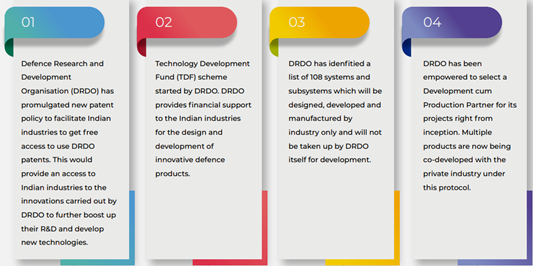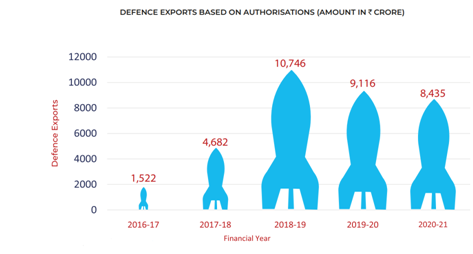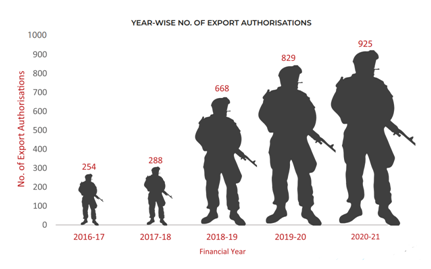Others
Reforms in Defence Sector
Posted On:
16 DEC 2021 17:43 PM
Reforms in Defence Sector
Propelling Private Sector Participation (2014 – 2021)
(Ministry of Defence)
December 16, 2021
We have taken a number of measures, including delicensing, deregulation, export promotion,
foreign investment liberalization in the defence sector. We are working ahead and focusing on transparency, predictability and ease of doing business.
-Prime Minister Narendra Modi
INTRODUCTION:
- Several policies & initiatives have been implemented to boost the private Defence sector, with the vision to make the country a global leader in the field. The steps taken include digitising internal processes; providing checks and balances to restrict imports and promote exports; formulating schemes aimed at promoting ease-of-doing-business; and encouraging the manufacture and purchase of indigenous products, which act as the wings for the private defence sector to take flight.
- Aerospace & Defence is estimated to be a Rs 80,000 Crore industry, to which the private sector’s contribution has steadily grown to Rs 17,000 Cr.
INCREASING THE SHARE IN DOMESTIC DEFENCE PROCUREMENT
- Design Capabilities
- A new category of capital procurement ‘Buy Indian-IDDM (Indigenously Designed, Developed and Manufactured)’ has been introduced in Defence Procurement Procedure (DPP)-2016 to promote indigenous design and development of defence equipment.
- The reform has helped in creating domestic design capabilities in the Defence Sector.
- In the four financial years from 2016-17 to 2019-20, 86 Capital Acquisition proposals worth Rs 93,727 Cr have been categorized under Buy (Indian-IDDM) category.
NO. OF ACCEPTANCE OF NECESSITY (AoN) ISSUED UNDER BUY (INDIAN-IDDM) CATEGORY
|
Year
|
Schemes
|
In Crore
|
|
2016-17
2017-18
2018-19
2019-20
|
8
30
27
21
|
56,950.48
7,926.62
17,589.37
11,260.73
|
|
Total
|
86
|
93,727.20
|
- Level Playing Field
- Defence Procurement Procedure (DPP) 2016 has been further revised as Defence Acquisition Procedure (DAP) 2020.This aims to provide the highest degree of probity, public accountability, transparency, fair competition and a level-playing field for Indian Private Defence Industries.
- Local Procurement
- The Department of Defence Production has notified 46 items under the latest Public Procurement Order 2017, notified by the Department for Promotion of Industry and Internal Trade (DPIIT), for which there is local capacity and competition. Procurement of such items shall be done from local suppliers only, irrespective of the purchase value.
- This reform provides preference to local suppliers in procurement, thus giving a boost to Make in India.
PROVIDING ACCESS TO CRITICAL TECHNOLOGIES
- Offset Policy Enabling Access to Critical Technologies
- Under the new Offset Policy, further Offset reforms have been included in Defence Acquisition Procedure (DAP) 2020, with thrust on attracting Investment and Technology for defence manufacturing.
- The new Offset Policy is expected to encourage investments for Transfer of Technology/Critical Technologies to Indian Industry in the Defence sector.
- Research And Development

ENCOURAGING INVESTMENTS
- Import Embargo
- As part of the Aatmanirbhar Bharat Package, the Ministry of Defence has notified a ‘Positive (Erstwhile Negative) List’ of 101 items for which there would be an embargo on the import beyond the timeline indicated against them.
- The second Positive List for indigenisation of 108 more items has also been notified on May 31, 2021.
- This would offer a great opportunity to the Indian Defence industries, including the private sector, to manufacture these items using their own design and development capabilities to meet the requirements of the Armed Forces in the coming years.
- This would comply with the emphasis on Vocal for Local.
- It would also provide an impetus to employment efforts of the country
- Foreign Direct Investment (FDI) Policy
- The Government of India has enhanced FDI in Defence Sector up to 74 per cent through the Automatic Route for companies seeking new defence industrial license and up to 100 per cent by Government Route wherever it is likely to result in access to modern technology.
- The obligatory Government approval for existing FDI approval holders/current defence licensees for change in equity/shareholding pattern up to 49 per centFDI, has been replaced with mandatory declaration for the same within 30 days of change of equity/shareholding pattern.
- The proposals for raising FDI beyond 49 per cent from such companies could also be considered with Government approval.
- Liberalisation of the FDI policy has simplified the route of flow of FDI. A higher automatic route limit facilitates ease of doing business. FDI Flow in the country has improved tremendously within six years. Before 2014, it was Rs 1,320 crore and after 2014 it was reported to be Rs 2871 crore.
- Defence Industrial Corridors
- In February 2018, the Government decided to establish two Defence Industrial Corridors (DICs) in Uttar Pradesh and Tamil Nadu to serve as an engine of economic development and growth of defence industrial base in the country.
- Five nodes have been identified for developing the Tamil Nadu Defence Industrial Corridor (TNDIC), namely Chennai, Coimbatore, Hosur, Salem, and Tiruchirappalli. Similarly, the UP Defence Industrial Corridor (UPDIC) connects six nodes, i.e. Agra, Aligarh, Chitrakoot, Jhansi, Kanpur and Lucknow.
- These nodes have been selected to harness and channelize the defence manufacturing potential that exists within the MSMEs, Ordnance Factory Boards (OFBs) and Defence Public Sector Undertakings (DPSUs) in and around these areas.
- Subsequent to the reform, both the State Governments (UP and Tamil Nadu) have also adopted attractive Defence and Aerospace policy to attract investment, which include subsidies on Capital Investment, Skill Development, Land Allotment, Certification etc. and exemptions/concessions on duties/taxes e.g. electricity duty, stamp duty, SGST etc.
- As on May 31, 2021, these efforts have resulted in an investment of Rs 1135 Crores in the UP Defence Corridor and Rs966 Crores in the TN Defence Corridor by OFB/DPSUs and private industry. Moreover, in TNDIC, the existing companies have additionally invested Rs 1140 Cr.
4. Offset Policy Encouraging Investments
- Under the new Offset Policy, offset reforms have also been included in the Defence Acquisition Procedure (DAP) 2020, with thrust on attracting Investment for Defence manufacturing.
- Offset guidelines have been made flexible by allowing change of Indian Offset Partners (IOPs) and offset components, even in signed contracts.
- Foreign Original Equipment Manufacturers (OEMs) are now allowed to provide the details of IOPs and products after signing of contracts.
- In order to bring more transparency and efficiency into the Offset discharge process, “Offset Portal” was created in May 2019.
- The new Offset Policy is expected to encourage investments, Transfer of Technology to Indian industry in the defence sector and growth of MSMEs.
- The Offset Portal has resulted in improvements like online audit of offset discharge claims, faster processing of claims, greater transparency, efficiency and accountability in the process, and introduction of disputes settlement mechanism through Independent Monitors.
5. Industrial Licensing
- Defence Products List requiring Industrial License has been rationalised, and manufacture of most parts or components now does not require Industrial License.
- The initial validity of the Industrial Licence granted under the Industries (Development & Regulation) Act - IDR Act has been increased from three years to 15 years with a provision to further extend it by three years on a case-to-case basis.
- A new online portal has been developed for facilitating filing of online applications for Industrial License under IDR Act 1951/Arms Act 1959.
- The increase in validity of Industrial Licenses has provided sufficient time and space for companies to operate and manufacture without hindrance.
- Easing of licensing procedures has provided companies with better opportunities to get finances from institutions.
- The ease in filing applications for Industrial License has resulted in an increase in the number of licenses and faster approvals.
- Total of 523 Industrial Licenses have been issued so far.
6. Defence Investor Cell
- Defence Investor Cell was created in February 2018 in the Ministry to provide all necessary information including addressing queries related to investment opportunities, procedures and regulatory requirements for investment in the sector.
- DIC has successfully handled more than 1000 cases/queries in the last two years since its inception.
ENHANCING INDIGENISATION
- SRIJAN Portal
- An Indigenisation portal namely SRIJAN has been launched on 14 August, 2020 for DPSUs/OFB/Services with an industry interface to provide development support to MSMEs/Start-ups/Industry for import substitution.
- Due to a dedicated indigenisation portal, all stakeholders i.e. the DPSUs/ OFB/SHQs/Defence Research and Development Organisation (DRDO) and private vendors are able to interact with each other.
- Details of imported items including specifications, drawings, quantity and import price on the portal enables Indian vendors to identify items within their capabilities.
- More than 9206 items have been displayed on the SRIJAN defence portal. The Industry has shown interest in 2099 items. These items are being processed for indigenisation by DPSUs/OFB.
- Indigenisation of Components
- Government has notified a ‘Policy for Indigenisation of Components and Spares used in Defence Platforms’ in March 2019.
- Pursuant to the new policy implementation, detailed frameworks/notifications for long term orders, Make II procedure, third-party testing have been issued which has created dedicated infrastructure and procedures for indigenisation.
- Long-term orders now enable DPSUs/OFB to place supply orders for items required by end users in a time period of upto 10 years which brings economies of scale for vendors.
Indo-Russian Cooperation
- An Inter-Governmental Agreement (IGA) on “Mutual Cooperation in Joint Manufacturing of Spares, Components, Aggregates and other material related to Russian/Soviet Origin Arms and Defence Equipment” was signed in September 2019.
- The objective of the IGA is to enhance the “After Sales Support” and operational availability of Russian origin equipment currently in service in Indian Armed Forces by organising production of spares and components within India by Indian Industry by way of creation of Joint Ventures/Partnership with Russian Original Equipment Manufacturers (OEMs) under the framework of the “Make in India” initiative.
- After this reform, more than 550 items have been identified which would now be manufactured in India.
TAPPING THE WORLD MARKET
- Exports
- Focused attention on promotion of exports of Indian defence products.
- Export authorisation procedures have been simplified and streamlined through online mechanisms.
- Intensive involvement of private industries in defence production.
- Targeted outreach programmes.
- The number of authorisations issued and the export value based on such authorisations has subsequently increased manifold.
- The average time taken to grant Export Authorisation has reduced from 86 days to 35 days for systems/subsystems and from 24 days to 13 days for parts and components with the introduction of the online system.
Through regular Webinars with involvement of Government and Industries Associations, many Friendly Foreign Countries (FFCs) have shown their interest in Indian Defence products.


- Open General Export License
- Notification of the Open General Export License (OGEL) and launching of Online Portal were done.
- OGEL permits the firms exporting items specified in the OGEL to the listed countries without approaching the Government.However, it is mandatory for the company to have an Internal Compliance Plan in place to get the benefit of OGEL.
HARNESSING DESIGN AND DEVELOPMENT CAPABILITIES
- Make-I Procedure
- The ‘Make’ Procedure of capital procurement has been simplified. The successfully developed prototypes under the supervision of the services are considered for direct procurement.
- There is a provision for funding of 70 per cent of development cost by the Government to Indian industry under Make-I category.
- There are specific reservations for MSMEs under the ‘Make’ procedure.
- The revised simplified procedure is more industry friendly, thus encouraging participation in Make Process.
- Make-II Procedure
- Separate procedure for ‘Make-II’ category (Industry funded) has been notified under Defence Procurement Procedure 2016 to encourage indigenous development and manufacture of defence equipment.
- Assurance of orders (on competitive basis) on successful development of prototype has encouraged private industry to undertake indigenous development and manufacture of defence equipment.
- So far, 56 projects relating to Army, Navy and Air Force, have been accorded Approval in Principle (AIP), worth Rs 30,000 Cr.
- Innovations for Defence Excellence
- An innovation-based ecosystem for defence entitled Innovations for Defence Excellence (iDEX) was launched in April 2018.
- iDEX aims at creation of an ecosystem to foster innovation and technology development in Defence and Aerospace by engaging industries including MSMEs, Start-ups, Individual Innovators, R&D Institutes and Academia and providing them grants/funding and other support to carry out R&D which has potential for future adoption for Indian Defence and Aerospace needs.
- Subsequent to the launch of iDEX, more than 1200+ Start-ups and Innovators responded to the four rounds of Defence India Start-up Challenge (DISC) and open challenge.
- 84 Start-ups/individuals have been selected to receive innovation grants in 38 technological areas (challenges). 39 contracts have been signed and prototypes are under development.
EASING THE BUSINESS
- Testing Facilities
- Testing facilities available with the Government have been opened up to the private sector.
- Private sector companies now have the option to make use of Government testing facilities while carrying out development of defence products.
2. Exchange Rate Variation Protection
- Exchange Rate Variation protection has been made applicable for the Indian private sector on par with Public Sector Undertakings for all categories of capital acquisitions.
- By DPP 2016, Exchange Rate variation has been made applicable for Rupee contracts with Indian Vendors, based on RFPs issued under all categories of capital acquisitions.
- This has resulted in a level playing field for the Indian private sector on par with Public Sector Undertakings for all categories of capital acquisitions.
3. Third Party Inspection
- Defence Sector, under the ‘Make in India’ initiative of the Government of India, is being provided the impetus and support for development and manufacturing of defence products. To augment the resources available with DGQA, a scheme for outsourcing of Third-Party Inspection (TPI) was promulgated on 30/05/2018.
- The qualified third-party testing agencies are empanelled by DGQA, and Users (Services: Army, Navy, Air Force, OFB, DPSUs, DRDO, Industry) have the option to offer some of the stores being procured to these agencies for testing.
Source:
PIB e – Booklet on REFORMS IN DEFENCE SECTOR
AG/HP/AR/KR
(Factsheet ID: 148594)
Visitor Counter : 1910
Provide suggestions / comments